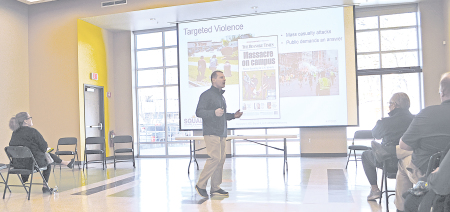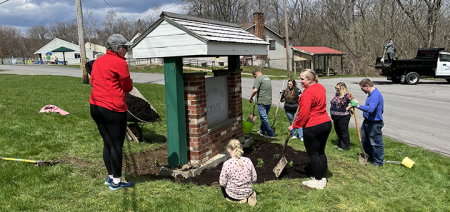Pet Owners Can Protect Their Pets From Rabies At Free Vaccine Clinics
Published:
November 16th, 2022
By:
Sarah Genter
 Chenango County pet owners can get their pets vaccinated against rabies at free clinics hosted by the Chenango County Department of Public Health, Environmental Division. Clinics will be held from 5:30 to 7 p.m. on Thursday, November 17 at the North Norwich Town Garage, and from 9 to 10:30 a.m. on Saturday, December 10 at the South New Berlin Fire Department. (Photo by Sarah Genter)
Chenango County pet owners can get their pets vaccinated against rabies at free clinics hosted by the Chenango County Department of Public Health, Environmental Division. Clinics will be held from 5:30 to 7 p.m. on Thursday, November 17 at the North Norwich Town Garage, and from 9 to 10:30 a.m. on Saturday, December 10 at the South New Berlin Fire Department. (Photo by Sarah Genter)
CHENANGO COUNTY — Following a recent outbreak in Norwich, local pet owners are encouraged to protect their four-legged family members from the deadly rabies virus at upcoming vaccine clinics hosted by the Chenango County Department of Public Health, Environmental Division.
Clinics will be held from 5:30 to 7 p.m. on Thursday, November 17 at the North Norwich Town Garage, and from 9 to 10:30 a.m. on Saturday, December 10 at the South New Berlin Fire Department.
Rabies vaccines are available for cats, dogs, and ferrets, and are completely free, although donations are accepted to help offset the cost of holding the clinics.
To attend the clinic and receive a free rabies vaccine, pet owners can register at Health.NY.gov/go2clinic, or by calling the Chenango County Department of Environmental Health at 607-337-1673.
"They drive in, they’ll pull up to the vaccination station, stop, get out with their pet, the vet will vaccinate just outside the car, and then load the dog back in. And there's lots of staff there to give instruction, to help with that process," explained Public Health Director Isaiah Sutton. "We’ve found with the drive-through clinics it really helps to schedule and space out the folks so no ones waiting in line too long. Then you show up right at your assigned time, and we get folks through pretty quick."
Rabies is a deadly virus that attacks the nervous system, and has been confirmed within City of Norwich limits recently: Sutton said four skunks were caught and tested positive for the disease.
"Quite often we’ll see an animal start to lose weight, look malnourished, they can develop paralysis. The recent spate of rabies we’ve seen in the city, we’ve collected these specimens that are alive but unresponsive," he explained. "A wild animal that will come right up to you, that’s not what you expect out of a raccoon. So that is cause for concern. If a normally passive animal becomes quite aggressive without any explanation, also cause for concern, and would bear some additional monitoring or testing."
"In domestic animals, if your animal acts markedly differently than you expect it to," he continued. "Sometimes they will see the classic foaming at the mouth, which is usually caused by an inability to swallow. This causes the throat to swell right up and shut. So animals will act like they’re aggressive toward water; it's really a frustration of not being able to swallow, and that causes that foaming that is kind of classic from the movies."
Sutton explained that rabies is contracted through the saliva and nervous tissue of an infected animal, and the state defines it as "a copious amount of the infected animal's saliva introduced into your system." Things like animal bites, scratches, or a rabid animal licking an open wound can cause animals and humans alike to contract rabies.
It is imperative that pet owners protect their animals by vaccinating them against rabies, as the only options for an unvaccinated and exposed animal are a strict six-month quarantine or euthanasia, according to Sutton.
"For an unvaccinated animal that is exposed to rabies, we either introduce a strict six-month quarantine. That is in a cage in a locked building, so double confined, for a period of six months where we monitor the health, which is very hard for an animal. Some folks it’s not a possibility. In a small apartment it may be hard to keep your dog in a cage in a bedroom," said Sutton. "Depending on the severity of exposure, sometimes euthanization and testing is the more proven option."
However, for a vaccinated pet, exposure to rabies can be mitigated by a simple booster shot.
"That’s exactly why we have these free clinics; we want to get as many pets as possible vaccinated. Because if an animal is vaccinated and is exposed, a simple booster after exposure is very successful at protecting against disease. Then they could go on their way and be no risk," Sutton said.
After their first rabies vaccine, dogs and cats will need a second dose one year later. After that, rabies vaccines should be given every three years.
For humans, preemptive rabies vaccines are generally only given to individuals in specialized fields, such as environmental health or veterinary fields. Currently there is no known cure for rabies in humans, but a post-exposure treatment of three to four vaccines is possible before the onset of symptoms, Sutton said.
"They’re 99.9 percent effective at preventing disease. So we like to say that it’s never too late to start [treatment] until someone becomes ill," he said. "Once symptoms onset in humans, there is no known treatment. Rabies is considered a deadly virus. Once someone becomes ill, there's only a handful of success stories, and there’s not really a known medication or treatment therapy that is attributed to those successes."
If residents suspect a wild animal has rabies, or that they or their pet were exposed to rabies, Sutton said they should call the Department of Environmental Health at 607-337-1673.
"At this point we don’t have any exposures, but we encourage folks to be diligent," Sutton said. "If you see an animal acting strangely, or if you've been scratched, bitten, or your pet has had some contact with an animal, contact our office. At the very least we’d like to have a discussion about that contact, just to determine whether or not there’s any risk, just so we can point folks in the right direction, whether we need to test the wild animal or start some post-exposure therapy for the person. We can kind of go over what the options are and what the risks are."
"Sometimes in town you don't think of it as much of a threat. But obviously we do have a bit of an outbreak going on, and we continue to monitor," he added. "We don’t encourage folks to go out and unnecessarily kill wild animals, especially not in the city. So if you’re having trouble please give us a call, or if you see an animal acting strangely."
Author: Sarah Genter - More From This Author
Comments








